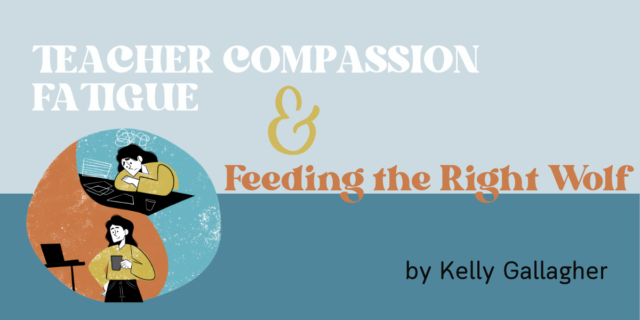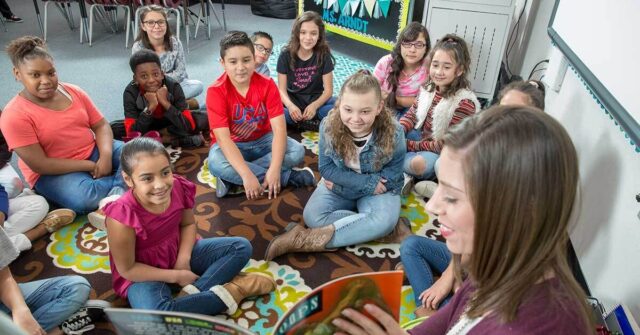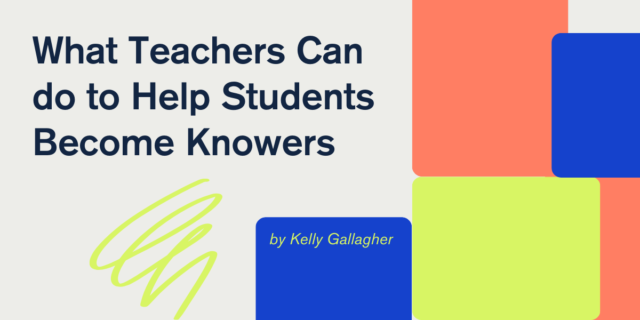
The following is an adapted excerpt from Kelly Gallagher’s forthcoming To Read Stuff You Need to Know Stuff.
***
Until very recently, humans have never encountered digital click-and-go reading. This new type of reading is actually rewiring the brain in ways never seen before (Wolf 2019). For the first time, humans are bombarded with waves and waves of information.
Go to any news website, left or right, and you will find numerous articles screaming for your attention. There is not enough time to read everything that is flying at us, so we are in a constant decision-making mode: Which articles should I read? Which ones should I ignore? And once you begin reading, there are more decisions to make. Which hyperlinks am I going to click? Which will I skim past? How far down that rabbit hole am I willing to go?
Much of this decision-making is grounded in our prior knowledge. Sitting at my computer this morning, I came across an article titled “IRS Plans to Hire Gun-Carrying Special Agents in All 50 States” (Revell 2023). I took a hard pass on reading it for a couple of reasons: I already knew that the IRS is arming some agents because arresting people who have criminally avoided paying taxes has become quite dangerous. I also checked where the article was published, noting that it came from a source with a history of trying to scare its older-skewing audience—a source I rarely find newsworthy.
Nope, time to move on.
See the Other Side
Another clue that helps me determine whether I will continue reading? I check to see if I recognize the author. I will read any movie review from Justin Chang, for example, but I try to avoid those written by Kenneth Turan. I have read Chang long enough to know that if he likes the movie, there is a very high probability that I will as well. I have disagreed with Turan so often that I stopped reading his reviews.
The danger here, of course, is that we rely on our prior knowledge in a way that leads us to read only people we like. Our brains are being manipulated and even rewired by algorithms that are designed to get our attention (Girish 2020). AI (artificial intelligence) feeds us articles we want to read and shields us from other points of view. There is a danger to remaining in an echo chamber, as evident by the sharp and widening divide found in this country (and others). If we are to overcome this—if we stand any chance of breaking down these silos—we need to ensure that we hear a range of opinions. I encourage my friends on the left to regularly read conservatives they often disagree with—David Frum, Ana Navarro-Cárdenas, David Brooks, Joe Scarborough, Rich Lowry, and Joe Walsh. And I likewise encourage my friends on the right to regularly read opposing views from Sherrilyn Ifill, David Rothkopf, Josh Marshall, Sarah Kendzior, Elizabeth Bruenig, and Mo Elleithee. It is unhealthy to ignore the “other side.”
How did I come up with these lists of commentators? Again, prior knowledge. Through a history of reading and sorting through the noise, I have weeded out extremists, shucksters, and masters of spreading Bandini. And, yes, this is an ongoing, never-ending, imperfect process, as my knowledge grows and shifts. But the more I read, the more I am able to determine if what I am reading is worth my attention.
As with the IRS article, sometimes prior knowledge can help you decide to not read an article. For another example, I recently stumbled across an article that claimed that Chelsea Clinton advocated for forcing every child in America to be vaccinated. Immediately, I wondered if that could possibly be true, so I looked to see what the source of the article was. It came from WND—an organization I had never heard of. A couple more clicks revealed that this organization is known for promoting falsehoods and conspiracy theories, including the false claim that former president Barack Obama was not born in the United States. The Southern Poverty Law Center notes the WND’s pages “are devoted to manipulative fear-mongering and outright fabrications designed to further the paranoid, gay-hating, conspiratorial and apocalyptic visions of [website founder Joseph] Farah and his hand-picked contributors from the fringes of the far-right and fundamentalist worlds” (n.d.). A couple more clicks led me to Snopes, a fact-checking nonpartisan website, which confirmed that, indeed, the claim about Chelsea Clinton was false.
Check the Facts
Readers can tell a lot from headlines. I am writing this on the day that a jury in New York found Donald Trump liable for sexual abuse and defamation in the E. Jean Carroll case. Here are three headlines from different publications—one from a far-left source, one from a moderate source, and one from a far-right source. I have mixed up their order. Can you guess which is which?
1. Trump to appeal verdict in E. Jean Carroll civil case, says he has ‘absolutely no idea’ who she is
2. E. Jean Caroll’s lawyers leveled a knockout blow to Trump
3. Trump found liable for defamation, sexual abuse in civil case
How did you do? Here is the answer key:
1. The source of this headline is Brooke Singman (2023), published on the Fox News website, which, according to AllSides, is a far-right news source. Note that the focus of the headline is on Trump’s reaction rather than the jury’s decision. (The headline also had a header above it that read, “Verdict is a disgrace.” This despite it being a unanimous decision.)
2. The source of this headline is Mitchell Epner (2023), writing for the Daily Beast, which according to AllSides is a far-left news source. There is no evidence that this verdict is a knockout blow to Trump and
his candidacy. In fact, a number of Republican senators rushed to his defense, calling the verdict a sham. Months later, Trump became the 2024 Republican candidate for president.
3. The source of this headline is James Fanelli and Corinne Ramey (2023) in the Wall Street Journal, which, according to AllSides, is a centrist news site. Note that this headline simply reports what happened without infusing any editorializing.
Understanding the bias of news organizations has saved me from reading articles written to deceive or to falsely enrage. Prior knowledge provides a shield against clickbait and angertainment.
***

In the age of click-and-go reading, why do students need to know information when they can just look things up?
Bestselling author Kelly Gallagher argues that to think critically, it’s imperative that we teach kids stuff. Lots of it. Why? Because students who know more are able to read more, and read better.
In To Read Stuff You Have to Know Stuff, Kelly draws from his own teaching practice to share the importance of building students’ prior knowledge at four levels:
Words: How building knowledge helps students to overcome word poverty
Sentences and Passages: How building knowledge helps students to comprehend “small” reading
Articles: How building knowledge helps students to critically read articles—an important skill in our digital age
Books: How building knowledge moves students away from fake reading and back into reading full-length books
To Read Stuff You Have to Know Stuff also shows how students can monitor their own comprehension. They can see that many reading difficulties aren't the result of not being a "good reader"— they simply lack knowledge.
Our students are fortunate to live in an age where so much information is a click away. But to read well—and think well—they need to own that knowledge.
Preorder To Read Stuff You Have to Know Stuff Available Now


